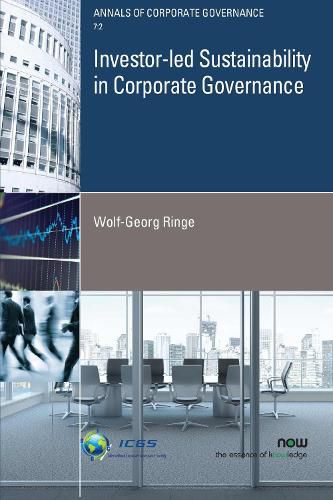Readings Newsletter
Become a Readings Member to make your shopping experience even easier.
Sign in or sign up for free!
You’re not far away from qualifying for FREE standard shipping within Australia
You’ve qualified for FREE standard shipping within Australia
The cart is loading…






This title is printed to order. This book may have been self-published. If so, we cannot guarantee the quality of the content. In the main most books will have gone through the editing process however some may not. We therefore suggest that you be aware of this before ordering this book. If in doubt check either the author or publisher’s details as we are unable to accept any returns unless they are faulty. Please contact us if you have any questions.
Investor-led Sustainability in Corporate Governance argues that ESG engagement can be a very powerful driver towards a more sustainability-oriented future in corporate governance. Investor-led sustainability has many advantages compared to a more prescriptive, regulatory approach. For example, a greater focus on investor initiatives would follow a more flexible and dynamic pattern rather than complying with pre-defined criteria that are slow to change. Moreover, investor-promoted assessments are not likely to impair welfare creation in the same way as ill-defined legal standards; they would also not trigger regulatory arbitrage and would avoid deadlock situations in corporate decision-making. Any regulatory responses should then be limited to a facilitative and supportive role.
This monograph proceeds as follows: Section 2 traces the recent trend towards increased ESG and sustainability in corporate governance and finance, and in particular documents the rise of investor-led initiatives in this field. Section 3 discusses the merits of such shareholder engagement and makes the case that ESG initiatives pursued by investors are consistent with business realities and conform with market logic of both demand and supply. Section 4 turns to the main advantage of ESG engagement, namely that it increasingly relies on coalitions and team-building between different types of institutional investors. It is presented that these teaming-up strategies have a dual benefit and a double genius in that they give greater support to campaigns, but also serve as an in-built screening mechanism that would exclude the realization of idiosyncratic benefits for individual investors. Sections 5 and 6 develop some regulatory implications and conclude the analysis.
$9.00 standard shipping within Australia
FREE standard shipping within Australia for orders over $100.00
Express & International shipping calculated at checkout
This title is printed to order. This book may have been self-published. If so, we cannot guarantee the quality of the content. In the main most books will have gone through the editing process however some may not. We therefore suggest that you be aware of this before ordering this book. If in doubt check either the author or publisher’s details as we are unable to accept any returns unless they are faulty. Please contact us if you have any questions.
Investor-led Sustainability in Corporate Governance argues that ESG engagement can be a very powerful driver towards a more sustainability-oriented future in corporate governance. Investor-led sustainability has many advantages compared to a more prescriptive, regulatory approach. For example, a greater focus on investor initiatives would follow a more flexible and dynamic pattern rather than complying with pre-defined criteria that are slow to change. Moreover, investor-promoted assessments are not likely to impair welfare creation in the same way as ill-defined legal standards; they would also not trigger regulatory arbitrage and would avoid deadlock situations in corporate decision-making. Any regulatory responses should then be limited to a facilitative and supportive role.
This monograph proceeds as follows: Section 2 traces the recent trend towards increased ESG and sustainability in corporate governance and finance, and in particular documents the rise of investor-led initiatives in this field. Section 3 discusses the merits of such shareholder engagement and makes the case that ESG initiatives pursued by investors are consistent with business realities and conform with market logic of both demand and supply. Section 4 turns to the main advantage of ESG engagement, namely that it increasingly relies on coalitions and team-building between different types of institutional investors. It is presented that these teaming-up strategies have a dual benefit and a double genius in that they give greater support to campaigns, but also serve as an in-built screening mechanism that would exclude the realization of idiosyncratic benefits for individual investors. Sections 5 and 6 develop some regulatory implications and conclude the analysis.